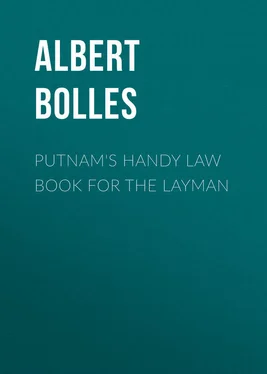Albert Bolles - Putnam's Handy Law Book for the Layman
Здесь есть возможность читать онлайн «Albert Bolles - Putnam's Handy Law Book for the Layman» — ознакомительный отрывок электронной книги совершенно бесплатно, а после прочтения отрывка купить полную версию. В некоторых случаях можно слушать аудио, скачать через торрент в формате fb2 и присутствует краткое содержание. Издательство: Иностранный паблик, Жанр: foreign_antique, foreign_prose, на английском языке. Описание произведения, (предисловие) а так же отзывы посетителей доступны на портале библиотеки ЛибКат.
- Название:Putnam's Handy Law Book for the Layman
- Автор:
- Издательство:Иностранный паблик
- Жанр:
- Год:неизвестен
- ISBN:нет данных
- Рейтинг книги:5 / 5. Голосов: 1
-
Избранное:Добавить в избранное
- Отзывы:
-
Ваша оценка:
- 100
- 1
- 2
- 3
- 4
- 5
Putnam's Handy Law Book for the Layman: краткое содержание, описание и аннотация
Предлагаем к чтению аннотацию, описание, краткое содержание или предисловие (зависит от того, что написал сам автор книги «Putnam's Handy Law Book for the Layman»). Если вы не нашли необходимую информацию о книге — напишите в комментариях, мы постараемся отыскать её.
Putnam's Handy Law Book for the Layman — читать онлайн ознакомительный отрывок
Ниже представлен текст книги, разбитый по страницам. Система сохранения места последней прочитанной страницы, позволяет с удобством читать онлайн бесплатно книгу «Putnam's Handy Law Book for the Layman», без необходимости каждый раз заново искать на чём Вы остановились. Поставьте закладку, и сможете в любой момент перейти на страницу, на которой закончили чтение.
Интервал:
Закладка:
The usual form of a chattel mortgage is a bill of sale with a conditional clause, stating the terms of the loan and that, on the mortgagor's failure to pay, the mortgagee may take possession of the property. Any persons who are competent to make a contract may make a chattel mortgage, and an agent may act for another as in many other cases. When thus acting his authority may be either verbal, or written, or may be shown by ratification. Persons also who have a common ownership in chattels, tenants in common or partners for example, may mortgage either their common or individual interests. A husband may give a chattel mortgage to his wife, and she in turn can give one to him. Likewise a corporation may make such a mortgage.
The law is broader in the way of permitting a minor, married woman, or corporation to be mortgagees when they cannot act as mortgagors of their property. Two or more creditors may join in such a mortgage to secure their separate debts. If the debt of one of them is fraudulent, his fraud, while rendering the mortgage fraudulent as to him, will not affect its validity as to the other.
How must the mortgaged property be described? With sufficient clearness to enable third persons to identify the property. The description must contain reasonable details and suggest inquiries which if followed will result in ascertaining the precise thing conveyed. A description of a baker's stock "stock on hand," would be too meager, so would be a description of "our books of account, and accounts due and to become due," but cattle described by their age, sex and location will satisfy the law, though the cattle of other owners should form part of the same herd, when they can be ascertained by following out the inquiries suggested by the mortgage. Again, a description that is wholly false avoids the mortgage, but if it is false only in part, this may be rejected and the mortgage remain valid for the remainder.
More generally the nature of the chattels conveyed determine largely the character of the description. Thus animals may be described by weight, age, height, color and breed; vehicles by their style and manufacturer's name; furniture by piece or set; crops growing or to be grown by their location and year. A general claim of "all" articles in a stated place is regarded as sufficient. Oral evidence is admissible to aid the description in identifying the subject-matter of the mortgage, and to explain the meaning and extent of the terms of the description.
A mortgage may be given for a future advance of money. Nor need the mortgage state that it is thus given; and the fact may be proved orally. But when the right of third parties are affected, such a mortgage is not valid against them unless the specific sum that is to be secured is set forth. Likewise to render a mortgage secure against attaching creditors of the mortgagor, there must be a distinct statement of the condition or terms of the mortgage; in other words the creditors have a right to know what interest the mortgagee really has in the property that secures to him rights superior to their own. The rule should also be stated that where the rights of third parties are in issue, it must appear that the mortgagee acquired the mortgage before they had any rights to the property.
The statutes require that chattel mortgages should be acknowledged and recorded. In some states the requirements are strict in respect to the disinterestedness of the official who takes the acknowledgment. An affidavit is another requirement. This must state several things, especially that the mortgage was given in good faith, and the nature and amount of the consideration.
What may be mortgaged? In general, any personal property that may be sold; many of the statutes define it. They cover a life insurance policy, corporation stock, railway rolling stock, seamen's wages, growing crops and trees, profits from the use of a steamboat, premiums earned by a horse, book accounts, leasehold interests, nursery stock, besides many other things. Whenever fixtures annexed to real estate retain the character of personal property they may be mortgaged. And when animals are mortgaged their natural increase are included. A mortgage made of an unfinished article will hold the article when finished if it can be identified.
By the common law nothing could be mortgaged that was not in existence at the time of the mortgage. By statute a mortgage may cover after-acquired property, and this statute has become very important especially with merchants, manufacturers, and others who are constantly changing their stocks of goods.
When the mortgagor fails to pay his debt, the right of the mortgagee to proceed in taking the property is usually regulated by statute, except when the parties have agreed themselves and in conformity with statute. The rights of the mortgagee depend in many cases on the title, whether that has passed to him by virtue of the mortgage, or whether it still remains conditionally in the mortgagor. Where the mortgagor still retains the title, a clause is often put into the mortgage to the effect that, should the mortgagor default in payment, the mortgagee may take possession of the property and sell it; and such a provision is valid and enforcible. Where the title is vested or transferred to the mortgagee by virtue of the mortgage, this is equivalent to giving him possession whenever he chooses to demand it. In other states the mortgagee's discretion is not so broad, before taking possession he must have reasonable grounds for believing himself insecure, that the mortgagor has done, or threatens to do, something that would impair the mortgagee's security.
Where the common law prevails and no statute has been enacted regulating the rights of parties, an important question is still unsettled in cases of a mortgage given on a stock of merchandise which permits the mortgagor to remain in possession and to sell the property mortgaged in the course of trade. Can he do this? In many states such a mortgage is regarded as fraudulent to creditors, in other states if such a mortgage is not, on proper judicial inquiry, proved to be a fraud, it will be upheld.
A provision in a mortgage that it shall cover after acquired property is regarded in some states as an executory agreement that it shall be held by the mortgagee as security; and the mortgagee may take possession of it, should the mortgagor fail to pay his debt, in accordance with his promise, before the rights of third persons have intervened. See Mortgage .
Chauffeur.– In many states minors are forbidden by statute to run automobiles. If therefore the owner of a car permits a minor to drive his car, he may be held liable for the injuries resulting from the driver's negligence. Should a chauffeur's license not disclose physical disabilities the license is not void, nor is he a trespasser in operating the machine on the highway. Such a license though defective is valid until revoked by the proper authority.
If discharged before the expiration of the term of his employment, an employer is still liable for his chauffeur's pay unless he has been unwilling or unable to fulfill his contract. If, however, he has been prevented by sickness or similar disability, he can recover, not perhaps the amount stated in the contract, but the worth of his services during the period of serving his employer.
A chauffeur may recover damages from his employer for injuries received while operating his car. The basis of the action is his employer's negligence. If the engine "kicks back" while he is cranking the car, and the employer contributed to the result by moving the spark lever, he is liable. If he is injured while running a car from a defective brake of which he had knowledge, he cannot recover. But if the employer knew, and the chauffeur did not know that the brake was defective, he could recover if injured in consequence of it. The employer is under no duty to warn his chauffeur of obvious dangers, or instruct him in matters that he may be fairly supposed to understand. If a chauffeur is riding at the owner's request, who is driving the car, he may recover if injured by the negligence of the owner in running the machine. Under the Workmen's Compensation Laws a chauffeur who is injured while running his car beyond the speed limit prescribed by statute can recover nothing. Nor is he justified by the custom of other chauffeurs in disregarding the rule. Lastly, if the owner of a car is injured, physically or financially, by reason of the wrongful conduct of his chauffeur, he has a remedy against him. See Automobile ; Garage Keeper .
Читать дальшеИнтервал:
Закладка:
Похожие книги на «Putnam's Handy Law Book for the Layman»
Представляем Вашему вниманию похожие книги на «Putnam's Handy Law Book for the Layman» списком для выбора. Мы отобрали схожую по названию и смыслу литературу в надежде предоставить читателям больше вариантов отыскать новые, интересные, ещё непрочитанные произведения.
Обсуждение, отзывы о книге «Putnam's Handy Law Book for the Layman» и просто собственные мнения читателей. Оставьте ваши комментарии, напишите, что Вы думаете о произведении, его смысле или главных героях. Укажите что конкретно понравилось, а что нет, и почему Вы так считаете.












